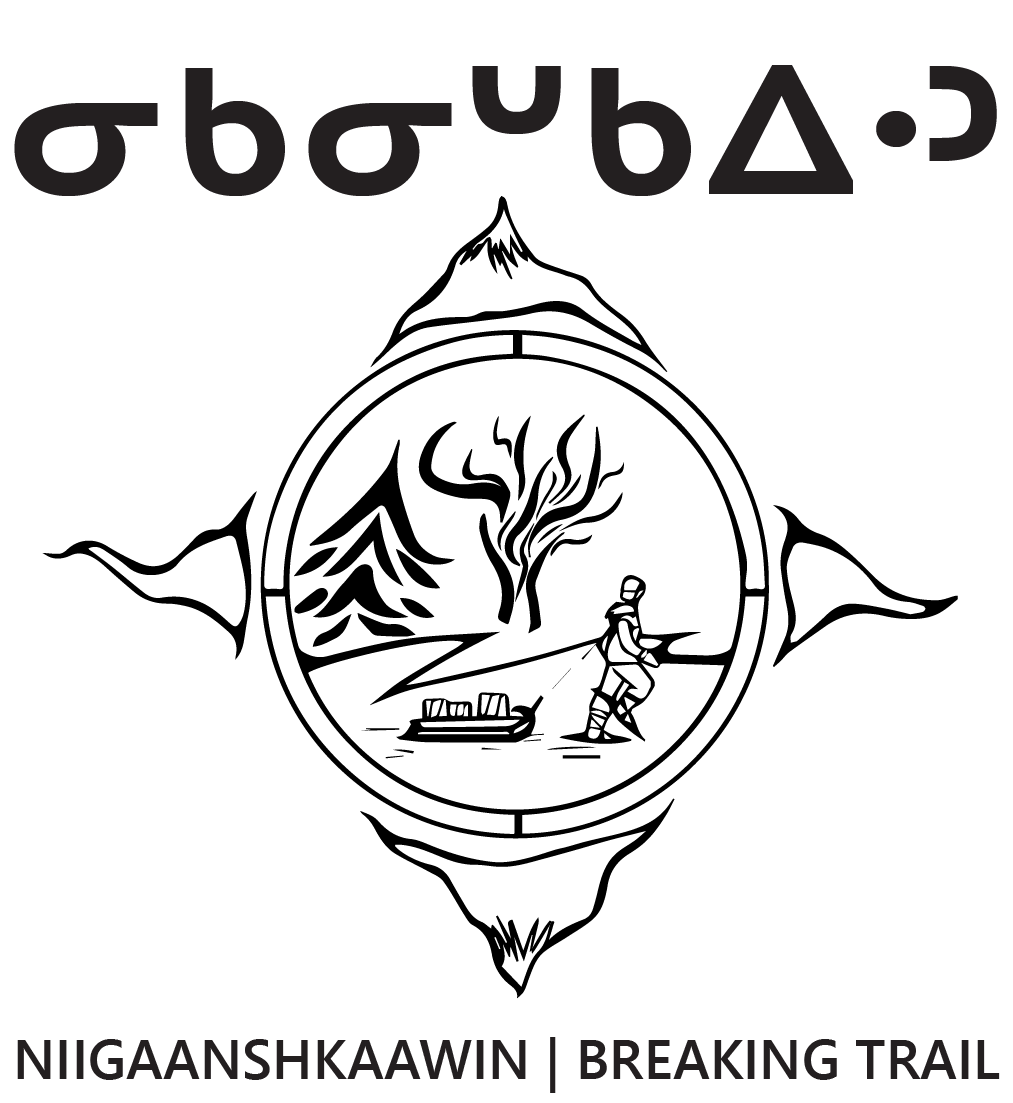
ᒥᐅᑫᐧᐊᓂᐧᐠ ᑲᐅᑭᒪᐊᐧᑭᓱᐊᐧᐨ
Meet the Managers
ᕑᐊᐧᐱᐣ ᐸᐣᑎᐣᐠ | Robin Bunting
ᐅᐱᔑᑯᑲᐣᐠ ᐃᐡᑯᓂᑲᐣ, ᑲᐧᐣᐡᑕᐣᐡ ᓫᐁᐠ ᐃᐡᑯᓂᑲᐣ | Lac Seul First Nation & Constance Lake First Nation robinb@tikinagan.org
11 ᐁᐣᑕᓱᐱᐳᓀᐨ, ᕑᐊᐧᐱᐣ ᓂᑕᑦ ᑲᑭ ᓇᑭᐡᑲᐣᐠ ᐊᐊᐧᔑᔑᐃᐧ ᐱᒧᒋᑫᐃᐧᐣ.
“ᒥᐦᐃᒪ ᒪᐊᐧᐨ ᓂᑕᑦ ᐁᑭ ᐃᓀᐣᑕᒪᐣ ᐁᑲ ᑲᐧᔭᐠ ᐁᑲᓇᐁᐧᐣᑕᑯᓯᔭᐣ ᒥᓇ ᐁᑭ ᓭᑭᓯᔭᐣ,” ᕑᐊᐧᐱᐣ ᐁᑭᔑ ᑲᓄᑫᐨ. “ᒪᐊᐧᐨ ᓂᑭᓭᑭᐡ. ᓂᑲᓄᑫ ᐁᑭ ᐃᓀᐣᑕᒪᐣ ᐁᑲ ᐃᐧᑲ ᐁᓇᐣᑕᐁᐧᐣᑕᒪᐣ ᐊᐊᐧᔑᐡ ᐃᐁᐧ ᒋᐃᓀᓂᒧᐨ.”
ᐊᒥ ᑕᐡ ᐃᐁᐧ ᑲᑭ ᐃᓀᐣᑕᒪᐸᐣ ᑭᓄᐊᐧᑲᐡ ᐁᐊᓄᑭᑕᒪᑫᔭᐣ ᐊᐊᐧᔑᔑᐃᐧ ᐱᒧᒋᑫᐃᐧᓂᐠ, ᓂᑕᑦ ᐁᑭ ᑲᓇᐃᐧᑭᑐᓀᔭᐣ ᐃᒪ ᐅᒋᐳᐁᐧ ᒥᑲᓇ ᑎᐯᐣᒋᑫᐃᐧ ᐱᒧᒋᑫᐃᐧᓂᐠ ᒣᑲᐧᐨ 1998-1999. ᕑᐊᐧᐱᐣ ᐅᑭ ᐱᒥ ᑲᒋᑎᓇᐣ ᐊᓂᐣ ᑲᐃᓯᓭᓂᐠ ᒥᓇ ᑲᔑ ᐱᒥᐃᐧᒋᑲᑌᓂᐠ ᐊᓄᑭᑕᒪᑫᐃᐧᐣ 12 ᐊᐦᑭ ᐁᑭ ᐊᓄᑭᑕᒪᑫᐨ ᐃᒪ ᐊᐊᐧᔑᐡ ᒥᓇ ᑎᐯᐣᒋᑫᐃᐧᐣ ᐱᒧᒋᑫᐃᐧᓇᐣ ᑲᔭᑭᐣ ᐅᐣᑌᕑᐃᔪ. ᒥᔑᓇᐧᔦᐠ ᐃᐡᑯᓂᑲᓂᐠ ᑭᔭᐃᔕ ᒥᓯᐁᐧ ᑭᐁᐧᑎᓄᐠ ᐅᐣᑌᕑᐃᔪ ᐁᑭ ᐊᓂ ᐅᒋ ᑭᑫᐣᑕᑭᐣ ᑕᔑᑫᐃᐧᓇᐣ ᑲᔑ ᐊᓄᑲᑕᒧᐊᐧᐨ ᑫᔑ ᒥᓄᔭᒪᑲᓂᐠ ᐅᑭᑭᓄᐦᐊᒪᑫᐃᐧᓂᐊᐧ. ᒥᐡᑕᐦᐃ ᐅᑭᑫᐣᑕᒪᐃᐧᐣ ᐃᐁᐧ ᐅᒋ ᐊᓂᔑᓂᓂᐃᐧ ᐊᐊᐧᔑᔕᐠ, ᐅᐡᑲᑎᓴᐠ ᒥᓇ ᑎᐯᐣᒋᑫᐃᐧᓇᐣ, ᒥᓇ ᐃᐡᑯᓂᑲᓂᐃᐧ ᓂᑲᓂᑕᒪᑫᐃᐧᐣ ᑲᐱᒥᐃᐧᑐᐊᐧᐨ ᐊᐊᐧᔑᔑᐃᐧ ᐱᒧᒋᑫᐃᐧᓇᐣ ᒥᓇ ᑲᔦ ᐁᑭ ᐅᒋ ᐊᔭᒥᑕᒪᑫᐨ ᐅᓇᑯᓂᑫᐃᐧᓂᐠ ᑲᐃᓯᓭᓂᐠ.
ᒣᑲᐧᐨ 2013, ᐃᒪ ᑭᐃᔑᑯᓯ ᑲᐧᐣᐡᑕᐣᐡ ᕑᐁᐠ ᐃᐡᑯᓂᑲᐣ ᐁᑭ ᓂᑲᓂᑕᒪᑫᐨ, ᓂᔕᐧ ᐁᑭ ᐱᐣᑎᑫᓭᐠ ᐅᓇᔓᐁᐧᐃᐧᓂᐣᐡ. ᐁᑲᐧ ᑕᐡ ᐁᑲ ᑲᑭ ᐅᒋ ᐅᑕᐱᓇᐠ ᐅᑭᒪᑲᓂᐃᐧ ᐱᒥᐸᑐᐃᐧᐣ, ᕑᐊᐧᐱᐣ ᑭᐃᓀᐣᑕᑦ ᒋᐃᐧᒋᑐᐨ ᑲᔑ ᐱᒥᐃᐧᒋᑲᑌᑭᐣ ᐃᐧᒋᐦᐃᐁᐧᐃᐧᓇᐣ ᐃᒪ ᑭᑕᔑ ᑫᐃᐧᓂᓇᐣ ᑲᔑ ᑕᑲᐧᑭᐣ. ᐁᑭ ᑭᑫᐣᑕᐣᐠ ᐊᓀᐸᓂᐦᐃᐁᐧᒪᑲᐠ ᐊᓂᐣ ᑲᔑ ᑲᓇᐁᐧᓂᒪᔭᐠ ᑭᓂᒐᓂᔑᓇᐣ ᒥᓇ ᐅᐡᑲᑎᓴᐠ ᑲᔑ ᓇᐣᑕᐁᐧᐣᑕᒧᐊᐧᐨ ᐃᐧᒋᐦᐃᑯᐃᐧᐣ. ᐁᑲᐧ ᑕᐡ ᐸᐣᑭ ᐁᑭ ᐊᔐᑲᐸᐃᐧᐨ, ᐅᑭ ᐊᐧᐸᑕᐣ ᐁᓇᐣᑕᐁᐧᐣᑕᑲᐧᐠ ᑭᑕᐧᑦ ᒋᐊᐧᓂᐡᑲᓇᒪᐠ ᑭᑐᑕᒧᐃᐧᓂᓇᐣ ᒥᓇ ᑲᔑ ᐅᓇᔓᐊᐧᓂᑎᓯᔭᐠ.
"ᐊᓇ ᐃᐧᓂᑯ ᐊᔕ ᐁᑭ ᐅᑎᑕᒪᐠ ᒥᓇ ᐁᑭ ᐊᔭᒥᑕᒪᐠ ᐅᓇᑯᓂᑫᐃᐧᐣ ᑭᓇᐃᐧᐣᐟ ᒋᐅᓇᔓᐊᐧᑕᒪᐠ ᐊᐊᐧᔑᔑᐃᐧ ᐱᒧᒋᑫᐃᐧᐣ, ᑭᔭᐸᐨ ᒥᐡᑕᐦᐃ ᐊᔭᒪᑲᐣ ᑫᐊᓄᑲᑌᑭᐣ, ᓇᐣᑕ ᑫᒋᐣ ᒥᔑᓄᔭᐦᑭ ᑕᐃᓯᓭ. ᐁᐧᐡᑲᐨ ᐊᔕ ᐅᐁᐧ ᑭᑐᐣᒋ ᑲᓇᐊᐧᐸᒥᑯᒥᐣ, ᐁᑲᑫᐧ ᓂᑲᑌᓂᑯᔭᐠ ᐅᑭᒪᐃᐧᐣ, ᔕᑯᐨ ᒋᒥᑲᐃᐧᓄᑕᒪᐠ ᐅᐁᐧ ᑲᑭᐱᔑ ᐃᐧᓴᑫᐣᑕᒪᐠ ᒥᓇ ᒋᐅᒋ ᐊᓂ ᒥᓄᔭᔭᐠ ᐅᐁᐧ ᐅᒋ ᒣᑲᐧᐨ ᐁᐱᒥ ᐊᓄᑲᑕᒪᐠ ᐃᒪ ᑲᐃᓇᑌᑭᐣ ᐅᓇᑯᓂᑫᐃᐧᐣ ᐯᓫ C-92. ᐁᑲᐧ ᑕᐡ ᐊᒥᐦᐅᐁᐧ ᑫᑐᑕᒪᐠ ᒋᑲᐡᑭᑐᔭᐠ, ᒋᒪᒪᐃᐧ ᐊᓄᑲᑕᒪᐠ ᐃᒪ ᑭᑕᔑᑫᐃᐧᓂᓇᐣ. ᒥᔕ ᐅᒪ ᑫᐅᒋᓯᓭᐠ ᑭᑕᐧᑦ ᒋᐅᑦᐱᑲᐸᐃᐧᑕᒪᐠ ᑭᑎᓇᑎᓯᐃᐧᓂᓇᐣ ᑲᐊᓂᔑᓂᓂᐃᐧᔭᐠ. ᑭᓂᒐᓂᔑᓇᐣ ᓄᑯᑦ ᑲᑭᔑᑲᐠ ᑭᐃᐧᐣᑕᒪᑯᒥᐣ ᐁᐦᐊᓂ ᒥᓄᐡᑲᒪᑲᑭᐣ ᐱᒪᑎᓯᐃᐧᓇᐣ ᐁᓇᐣᑕᐁᐧᐣᑕᒧᐊᐧᐨ ᑲᐧᔭᐠ ᒋᓯᓭᑭᐣ ᑲᑭᓇ ᑫᑯᓇᐣ. ᐅᑕᔭᒥᑕᓇᐊᐧ. ᒪᐦᑎ ᑲᐃᐧᑕᓄᑭᒥᑎᒥᐣ ᒥᓇ ᒋᑭ ᐃᔑ ᒪᒋᓭᑭᐣ ᐅᑫᐧᓂᐊᐧᐣ ᐅᓇᐣᑕᐁᐧᐣᑕᒧᐃᐧᓂᐊᐧ."
At just 11-years-old, Robin had her first interaction with child welfare.
“This was the first time in my life I felt unsafe and in harm,” Robin recalled. “It was scary. I recall thinking that I never want a child to feel this way.”
That mindset began a long career in child welfare, starting by answering phones for Ojibway Tribal and Family Services in 1998-1999. Robin continued to garner experience and knowledge with 12 years in frontline services with child and family service agencies in Ontario. She has travelled widely among First Nations across Northern Ontario learning about each community’s healing traditions. She brings extensive experience with First Nation children, youth and families, and First Nation leadership navigate the child welfare system and representation in legal proceedings.
In 2013, she moved back to Constance Lake First Nation where she became a leader for her people, serving two terms as Band Councilor. After declining a nomination for Chief, Robin decided she wanted to help bring change to the systems in our communities. Knowing everything has an impact on the way we care for our children and youth in need. Stepping back, she saw that to make change we needed to revitalize our own ways and govern ourselves.
“Although we have reached and advocated for a law to have authority in child welfare, there is so much work that needs to be done, it may take years to come. We have lived in these systems for so long, we have lived with colonization for so long, we need to acknowledge this pain and heal from this while taking the steps towards the Options set out in Bill C-92. To achieve this, it will take collaboration from everyone in our communities. Now is our time to revitalize our way as First Nations peoples. Our children today are proving to us that life is getting better because they want better. They are voicing it. Let's work together and make it happen.”


